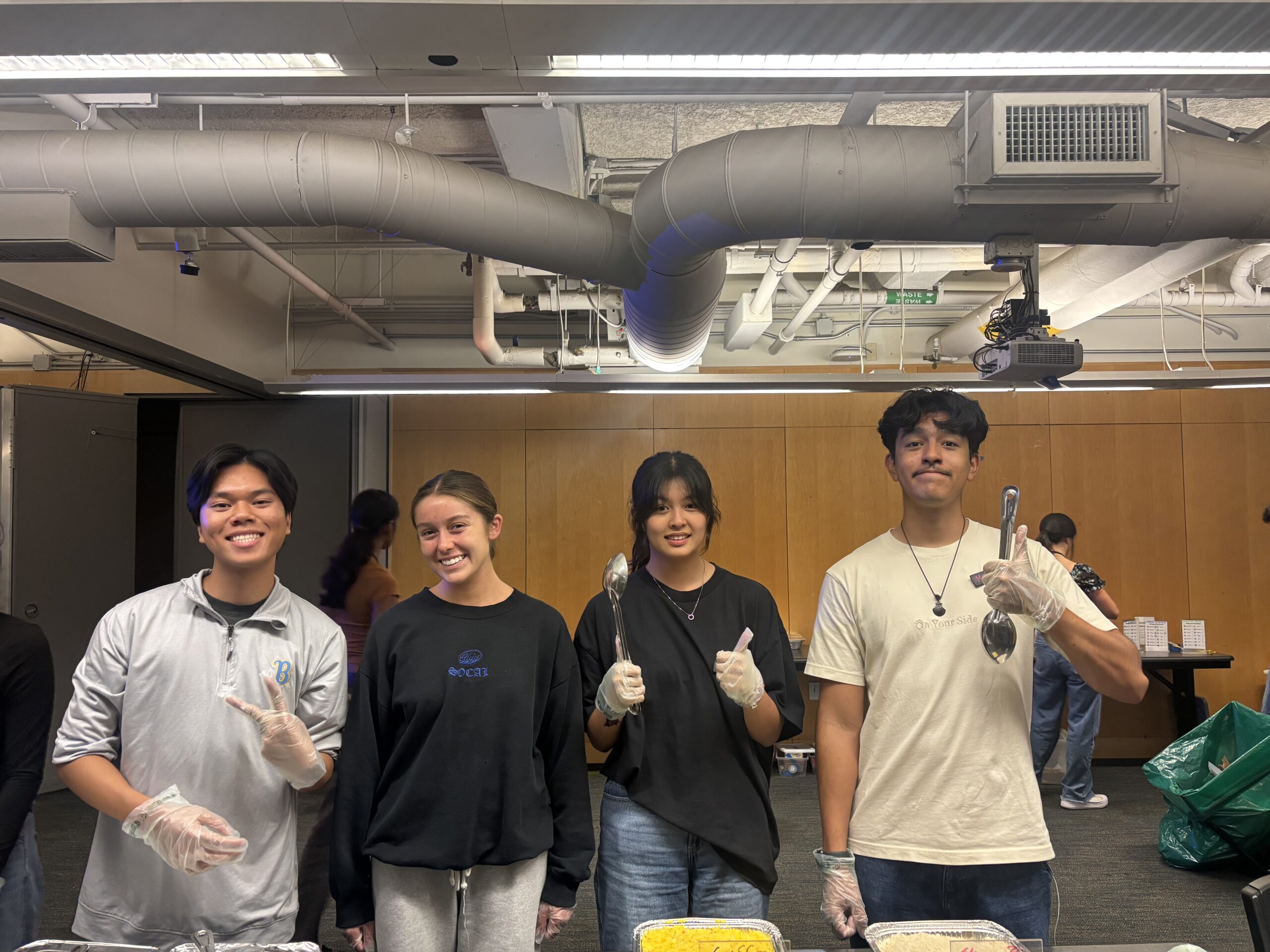
Full hearts and full bellies describe the UCLA students behind the Bruin Dine organization and the campus community they feed. Resolving to address the intertwined issues of food waste and food insecurity at UCLA, the club gives leftover campus food a bigger purpose: out of landfills and nourishing Bruins.
Founded in the fall of 2017, Bruin Dine was a joint effort of the Hunger Project, Swipe Out Hunger, and Bruin Shelter, with the first food recovery event in February 2018. Enduring setbacks in subsequent years, including the pandemic, the small leadership group of four students doing one event per week has grown to a general membership of 106, comprised of committees (fundraising, engagement, advocacy, sustainability), that host food recovery events three times a week each quarter.
“UCLA is such an amazing community. Even though it’s a big school, each one of us can contribute to something much greater than we are, so I think it’s important to see that if the person next to you isn’t thriving, there are ways to do something about it — there’s a way for you to make change, and this is one of them,” said Alejandra Flores, head of Bruin Dine’s sustainability committee.
That contribution, in just a single quarter of activity, accounts for almost 2,500 meals served and around 3,900 pounds of food saved.
Here’s the dish: Bruin Dine recovers leftover food not put out from the Epicuria, De Neve, and B-Plate dining halls on the Hill. Dining services staff package and label (listing allergens) the food. The club also picks up pastries from Kerckhoff Coffeehouse and the Anderson Café.
Transported down the Hill in a UCLA Community Programs Office van, food recovery events are hosted in the Student Activities Center basement on Tuesday, Wednesday, and Thursday from 10:00 to 11:00 p.m. with tables, chairs, plates, napkins, and utensils set up.
Open to all UCLA diners, undergraduate and graduate students, residents, commuters, as well as staff and faculty, are served proteins, veggies, grains, sometimes even a soup, and desserts. Attendees are encouraged to bring reusable containers to take leftovers home.
A mix of Bruins dine: transfer students, international students, residents of the University Apartments, some without any housing, and UCLA employees, for reasons such as a lack of money, no time, or the stress of having to buy groceries and put a meal together. On a typical night, about 10 club members will serve somewhere between 50 and 60 people, about 90 meals, factoring in second helpings. Many hear about Bruin Dine by word of mouth—also through the group’s Instagram presence, with active outreach engagements, tabling at the CPO Welcome Reception, Latinx Annual Welcome, and Enormous Activities Fair.
In addition to food recovery, Bruin Dine holds workshops throughout the year to promote sustainable eating habits and is currently working on showing how to give leftovers a second life as another meal.To keep the operation going, Bruin Dine can always use volunteers, says Alejandra, especially for the coming winter and spring quarters. And while there are fundraising efforts, a little aid thankfully comes to the service project through a Resources First Referendum approved in the Undergraduate Students Association Council election held in the spring of 2025. Through a fee increase, Bruin Dine receives some funding, along with two more campus organizations dedicated to basic needs and other resources.
“There’s been many times where people will come up to us and say, I really needed this today and we’re able to provide it for them, so it’s a great experience, on both sides. I’ve found it extremely uplifting and inspiring to be a part of this community,” said Alejandra.
“This food is going somewhere better, to people who need it and getting diverted from landfills — accomplished by a student organization.”
For additional food resources for Bruins, follow these UCLA organizations: UCLA Basic Needs at Strathmore and the UCLA Community Programs Office Food Closet. To find a local food bank, visit cafoodbanks.org/find-food.
